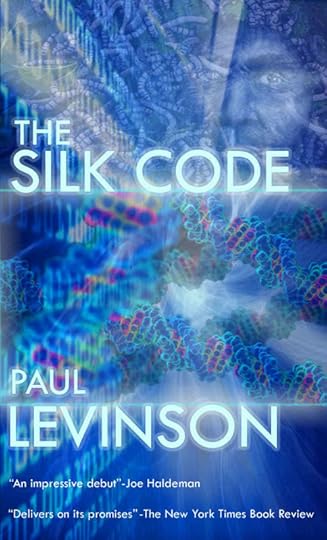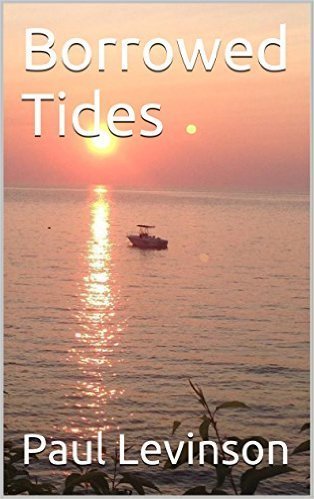Paul Levinson's Blog: Levinson at Large, page 73
January 31, 2022
Podcast Review of The Colony
Welcome to Light On Light Through, Episode 240, in which I review The Colony on Netflix.
Written blog post review of The Colony
Paul Levinson's books ... Paul Levinson's music
January 28, 2022
Rosemary Claire Smith's "Next Frontier": Outstanding Alternate History to the Moon

This seems to be my year -- by which I mean all of 2021 and 2022 -- for alternate history. The second season of For All Mankind in February 2021, Ronald D. Moore's masterful alternate history about the race to the Moon in the 1960s, and ensuing decades, was even better than the first. My 90-minute interview with Rufus Sewell in July 2021 about The Man in the High Castle series on Apple TV+ got me even deeper into that one-of-a-kind stunning story. And just this month, a favorite story that I've written was published -- "It's Real Life," my alternate history about The Beatles.
So I was well prepared to catch up in my reading with Rosemary Claire Smith's "The Next Frontier" in the July/August issue of Analog Magazine. And the novelette exceeded my high expectations, delivering a memorable mix of alternate history about our species reaching the Moon, heart-throbbing detailed astronaut action in space, keen social valence, and even a scene that brought tears to my eyes.
Here's the set-up, with just some introductory spoilers: Natalya Orlova has defected from the Soviet space program, and has joined Armstrong, Aldrin, Bean, et al as possible to likely candidates for our American missions to the Moon. Jackie Kennedy has become co-director of NASA (I just love that!), and she's far tougher than the media allowed us to see in our reality. Bobby Kennedy survived the attempted assassination in June 1968 (with just a scar on his head) -- another facet of this alternate history that I love -- and is locked in a tight race with Nixon for the U. S. Presidency.
If that doesn't tempt you to read this story, I guess alternate history is not your thing. Smith's novelette makes important statements about the role of women in getting our species off this planet (similar in that regard to For All Mankind), as well as the realpolitik of space travel. Highly recommended, to say the least, not just to read but as the best novelette for the AnLab, Nebula, and Hugo Awards this year.
alternate history about The Beatles

Jeff Harris travels to the past to prevent the Challenger disaster
And here's a Q & A with Rosemary Claire Smith on the Analog blog about how and why came to write "Next Frontier".
Paul Levinson's books ... Paul Levinson's musicJanuary 26, 2022
The Colony: Conradian/Keplerian Noir

Well, I just saw The Colony (original name of the movie, Tides) on Netflix. This seems to be the season for post-apocalyptic stories, understandable given the dangerous state of world, in areas ranging from COVID to climate to Russia massing troops on the border of Ukraine. I thought Station Eleven, a series on HBO Max based on Emily St. John Mandel's novel, was a masterpiece. I wouldn't say the same about The Colony. But I will say that, for my money, it's much better and more worth seeing than the massively popular Don't Look Up. (Though I'll also admit to you that I paid no money for either, other than the subscription price on Netflix.)
In The Colony, Earth has been devastated by both climate and plague, and some rich people on Earth have escaped to Kepler. a planet which we've indeed in our current reality identified as being in the Goldilocks zone, i.e, likely amenable to human life. But it turns out it's not that habitable after all because, although the Earthlings can survive there, they lose their fertility. In a last desperate move, they send two expeditions back to Earth, to see if perhaps our planet cured itself and was once again capable of supporting our demanding species, if not in the style to which we've become accustomed, at least in a way that enabled us to live beyond a single generation.
The answer is a qualified yes. The toxic environment is much better, but the people now living on the planet have reverted to barbarism. This aspect of the story is the least original, but the overall narrative still works well because our astronaut from Kepler, from the second ship from that arrives here, encounters survivors from the first voyage, with all kinds of repercussions and results.
I won't say anything more about the plot. But this Conradian/Keplerian "Heart of Darkness" in which Earth itself is that heart serves as a good tableau for a realistic morality play in the Asimovian tradition, in which humans who have made it far from our solar system are certainly different from those they left behind but are still part of our species, with all of our strengths and flaws. Fine work by Nora Arnezeder as Blake (the astronaut on the second voyage), Sebastian Roché as her father from the first voyage, Iain Glen, also from the first voyage, and Eden Gough as Neil, a precocious boy on Earth.
first starship to Alpha Centauri has just enough fuel to get there Paul Levinson's books ... Paul Levinson's musicThe Colony: Keplerian Noir

Well, I just saw The Colony (original name of the movie, Tides) on Netflix. This seems to be the season for post-apocalyptic stories, understandable given the dangerous state of world, in areas ranging from the COVID to climate to Russia massing troops on the border of Ukraine. I thought Station Eleven, a series on HBO Max based on Emily St. John Mandel's novel, was a masterpiece. I wouldn't say the same about The Colony. But I will say that, for my money, it's much better and more worth seeing than the massively popular Don't Look Up. (Though I'll also mention that I paid no money for either, other than the subscription price on Netflix.)
In The Colony, Earth has been devastated by both climate and plague, and some rich people on Earth have escaped to Kepler. a planet which we've indeed in our current reality identified as being in the Goldilocks zone, i.e, likely amenable to human life. But it turns out it's not that habitable because, although the Earthlings can survive there, they lose their fertility. In a last desperate move, they send two expeditions back to Earth, to see if perhaps our planet cured itself and was once again capable of supporting our demanding species
The answer is a qualified yes. The toxic environment is much better, but the people now living on the planet have reverted to barbarism. This aspect of the story is the least original, but the overall narrative still works well because our astronaut from Kepler, from the second ship from that arrives here, encounters survivors from the first voyage with all kinds of repercussions and results.
I won't say anything more about the plot. But this "Heart of Darkness" in which Earth itself is that heart serves as a good tableau for a realistic morality play in the Asimovian tradition, in which humans who have made it far from our solar system are certainly different from those they left behind but are still part of our species. Good work by Nora Arnezeder as Blake (the astronaut on the second voyage), Sebastian Roch�� as her father from the first voyage, Iain Glen, also from the first voyage, and Eden Gough as Neil, a precocious boy on Earth.
first starship to Alpha Centauri has just enough fuel to get there Paul Levinson's books ... Paul Levinson's musicJanuary 24, 2022
The God Committee: Life, Death, and Reality

In Baltimore two weeks ago, a 57-year-old man received a genetically modified heart from a pig. So far, so good. That's not science fiction. That really happened. And for the very first time.
Which means that The God Committee, which debuted at Tribeca in June 2021, showed up later on Netflix, and I saw this evening, is not science fiction, either. Dr. Boxer, well-played by Kelsey Grammer, is working on transplanting a pig's heart into a monkey in the movie, and could well have been doing that in our reality. And to make The God Committee even more profound, that's not even the centerpiece of the story.
That would be the way that decisions are made in hospitals in transplant cases, in an an environment, our environment, in which there are an intractable paucity of vital organs suitable for transplant to desperately needy people. If we could obtain such organs from pigs, that would be a life-and-death game changer, literally. The real events two weeks show we're just about there, and the movie depicts a yesterday that is not quite over as yet.
And therefore the gamut of human foibles and flaws figure in the God Committee's decisions. If someone's family wants to donate millions of dollars to the hospital, will that influence at least some decisions of some of the members of the committee? Of course it will. So will other not explicitly medical factors, such as the family support the recipient will have, and the inevitable social politics and pecking order in any committee decision.
These are all brought to bear in this memorable movie. In addition to Kelsey Grammer, Julia Stiles puts in a strong, sensitive performance as a doctor and Boxer's soon to be erstwhile lover, as does Janeane Garofalo as another doctor with a keener pragmatic sense than most, and Colman Domingo (Fear the Walking Dead!) as Fr. Dunbar
I'll say no more about the plot, because I don't want to give anything away. But I will say see this almost science fiction movie and the indelible moral drama it presents. Good work by writer and director Austin Stark, from the play by Mark St. Germain.

Podcast: Arne Berggren and Kristine Berg Interviewed by Paul Levinson about Nordic Noir
Welcome to Light On Light Through, Episode 239, in which I interview Arne Berggren and Kristine Berg about their two television series, Outlier and Catch and Release, and Nordic Noir filmmaking.
Written blog post reviews of Outlier and Catch and Release more about The Silk CodePaul Levinson's books ... Paul Levinson's music
January 23, 2022
Ozark 4.1-7: Hold On Tight

Just binged the first half of the final (fourth) season of Ozark, some seven episodes of pure adrenalin, propelled by powerful plots with memorable characters and all kinds of stunning surprises, including deaths.
[Tell you what -- for this review, no specific spoilers, you can read ahead with confidence.]
In fact, all the ingredients that made the previous three seasons so good, including the Ozark countryside, are here in abundance. Making these seven episodes, in sum, right up there with the best of the previous seasons.
Marty, Wendy, and Ruth in all in top form. Jonah, who has been developing into a brilliant, tough-minded teenager, has his biggest role yet. Darlene, Wyatt, and Charlotte are in true, strong, form as well. The complexities of Mexican drug cartels and criminals and police of various ranks in the U. S. are given satisfying and sometimes unpredictable workouts.
Ozark is often compared to Breaking Bad. A fair enough comparison, though Breaking Bad was more of a one to two man show, and Ozark has always been more about family. For that reason, I'd also say that The Mosquito Coast, which had one season last year on Apple TV+ ,with a second coming up, is even more like Ozark, and indeed can be clearly seen as inspired by it.
The acting of all the characters in Ozark is great, with special applause for Jason Bateman as Marty, Laura Linney as Wendy, and Julia Garner as Ruth. My favorite new character is former cop now private detective Mel Sattem, given an unshakeable, moody, noir performance by Adam Rothenberg, which reminded me of some of those hardboiled detectives in the movies from the 1930s through the 1950s. The seventh episode ends with a cliffhanger as sharp as you'll find, setting up the finale episodes as immediate, must-see viewing, whenever they reach the Netflix screen.
See also Ozark 3: Breakups ... Ozark 2: Against All Odds and More ... Ozark 1: Frying Pan Into the Fire

Paul Levinson's books ... Paul Levinson's music
January 22, 2022
audiobook published of Unburning Alexandria: The Novelette

This is the original novelette published in 2008 in Analog Magazine, sequel to The Plot to Save Socrates novel (2006), expanded into a novel in 2013, and followed by the third novel in the Sierra Waters series, Chronica (2014).
Audiobook available wherever audiobooks are sold. Here is the link to the audiobook on Amazon.
January 21, 2022
Podcast Review of Munich: The Edge of War
Welcome to Light On Light Through, Episode 238, in which I review Munich: The Edge of War on Netflix.
written blog post review of Munich: The Edge of War
Paul Levinson's books ... Paul Levinson's music
Munich: The Edge of War: A Brilliant Tinge of Alternate History

I guess this was a perfect night to watch Munich: The Edge of War on Netflix. Russia is on the verge of invading Ukraine. The Trumpists -- including Trump himself -- have still not been brought to justice for their insurrection and attack on our Capitol last January 6. And the movie is based on the novel Munich by Robert Harris, author of the alternate-history masterpiece Fatherland, in which Germany won the Second World War. Not as much of a masterpiece as Philip K. Dick's The Man in the High Castle (made into an incandescent series on Amazon), for sure, but I'd watch a movie based on a Harris novel any time.
And Munich: The Edge of War is one memorable powerhouse of a movie. As Neville Chamberlain goes to Munich to sign a deal with Hitler which gave Germany a piece of Czechoslovakia, which as we learned in school led to Chamberlain proclaiming "peace in our time" and Hitler to start gobbling up the rest of Europe less than a year later, two young diplomats, a Brit and a German, formerly classmates at Oxford, try to stop that deal from happening.
Their failure is a fact of history. Their existence, I assume, is not. What I'm not sure about is the way Chamberlain is portrayed in this brilliant film, in which he seems to really know what he's doing, deliberately delaying a hot war with Germany to give Britain and the United States crucial time to build up their forces. That's what we get for watching a movie based on a novel by an author who is so deft at writing alternate histories.
But the movie, as I just said, is brilliant, and eminently worth seeing. Historical dramas can be powerful and suspenseful even if we know the ending. As a measure of how good this movie was, I felt bad that these two central characters -- the British and German friends -- didn't really exist. That's probably because they are fiction, and where the rise of Hitler is concerned, fiction can often be better than reality -- unless we're talking about Fatherland or The Man in the High Castle.
Levinson at Large
- Paul Levinson's profile
- 341 followers





